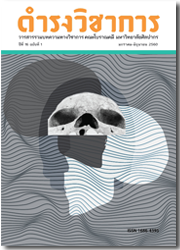The use of English Language and Identity Expression in Facebook Statuses in Thailand
Keywords:
Computer-Mediated Discourse (CMD), Facebook, Linguistic Identity, English as a foreign language (EFL)Abstract
The paper examined the use of English as a foreign language (EFL) in Facebook to study the personal and linguistic identities of Thai Facebook users in relation to their language choice. The research questions in the study were 1) How is Computer-Mediated Discourse used by participants in setting Facebook statuses? and 2) How are the identities of participants expressed through language choice on their Facebook statuses? The researcher employed a textual analysis approach and the interviews of five participants to explore the research questions. It was found that new linguistic features which deviated from the standard norms in both Thai and English were frequently observed in Computer-Mediated Discourse. Also, there was a correlation between the language choices and the participants’ educational and professional backgrounds. Lastly, Standard English continues to be recognized as the idealized linguistic identity which Thai participants wish to possess.
References
Anurit, Pacapol Jakrapan, Pornpatcharapong, Wittaya, Chongpakdeepong, Supaporn, Sataman, Kanit, Dinh, Phuong Quynh Ho, Yu, Tiantian, & Naing, Ei Mon, 2011. Influences of social media on the use of Thai language, International Journal of Academic Research in Business and Social Sciences 1 (2).
Blommaert, Jan., 2008. Artefactual ideologies and the textual production of African languages. Language & Communication 28: 291-307.
Bourdieu, Pierre, 1977. The economics of linguistic exchanges. Social Science Information 16(6): 645-668.
Fung, Loretta, & Carter, Ronald, 2007. New varieties, new creativities: ICQ and English-Cantonese e-discourse. Language and Literature 16: 345-366.
Herring, Susan, 1998. “Le style du courrier électronique: Variabilité et changement.” Terminogramme.
Herring, Susan, 2001. Computer-mediated discourse. In D. Tannen, D. Schiffrin & H. Hamilton (Eds.), Handbook of Discourse Analysis. Oxford: Blackwell.
Jenkins, Jennifer, 2004. Global Intelligibility and local diversity: Possibility and paradox? In R. Rudby & M. Saraceni (Eds.), English in the world: Global rules, Global roles. London: Continuum.
Jenkins, Jennifer, 2007. English as a lingua franca: Attitude and identity. Oxford: Oxford University Press.
Kachru, Yamuna, & E. Smith, Larry, 2009. The Karmic cycle of world Englishes: some futuristic constructs. World Englishes 28(1): 1-14.
Kachru, Yamuna, & Nelson, Cecil L, 2006. World Englishes in Asian Contexts. Hong Kong: Hong Kong University Press.
Omoniyi, Tope, & White, Goodith, 2006. The sociolinguistics of identity. London: Continuum.
Paolillo, John C, 1996. Language choice on soc.culture.pubjab. Electronic jornal of communication 6(6).
Pavlenko, Aneta, & Blackledge, Adrian, 2004. Negotiation of identities in multilingual contexts. Clevedon: Multilingual Matters.
Preston, Lowe, 2005. How can you learn a language that isn’t there? In J. Przedlacka, K. Dziubalska-kolaczyk & J. Przedlacka (Eds.), English pronunciation models: A changing scene. Frankfurt am Main: Peter Lang.
Seargeant, Philip, & Tagg, Caroline, 2011. English on the internet and a ‘post-varieties’ approach to language. World Englishes 30(4): 496-514.
Widdowson, Henry, 2003. Defining issues in English language teaching. Oxford: Oxford University Press.
Downloads
Issue
Section
License
บทความนี้เป็นผลงานของข้าพเจ้าแต่เพียงผู้เดียว และ/หรือเป็นผลงานของข้าพเจ้าและผู้ร่วมงาน ตามชื่อที่ระบุในบทความจริง และเป็นผลงานที่มิได้ถูกนำเสนอหรือตีพิมพ์ที่ใดมาก่อน




